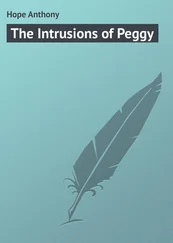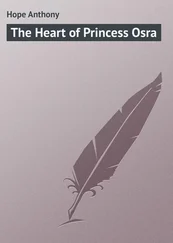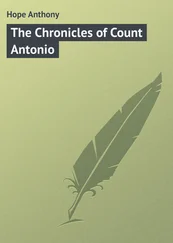
I had one more battle left to fight – a battle that would, I knew, be severe, and was bound to end in my complete defeat. Was I not back from the Tyrol, without having made any study of its inhabitants, institutions, scenery, fauna, flora, or other features? Had I not simply wasted my time in my usual frivolous, good-for-nothing way? That was the aspect of the matter which, I was obliged to admit, would present itself to my sister-in-law; and against a verdict based on such evidence, I had really no defence to offer. It may be supposed, then, that I presented myself in Park Lane in a shamefaced, sheepish fashion. On the whole, my reception was not so alarming as I had feared. It turned out that I had done, not what Rose wished, but – the next best thing – what she prophesied. She had declared that I should make no notes, record no observations, gather no materials. My brother, on the other hand, had been weak enough to maintain that a serious resolve had at length animated me.
When I returned empty-handed, Rose was so occupied in triumphing over Burlesdon (когда я вернулся с пустыми руками, Роуз была так охвачена радостью победы над Берлисдонами) that she let me down quite easily, devoting the greater part of her reproaches (что позволила мне довольно легко отделаться, посвятив большую часть своих упреков; to let down – опускать; унизить, уронить / репутацию / ; to let smb. down easily / gently / lightly – пощадить чье-л. самолюбие, отнестись мягко ) to my failure to advertise my friends of my whereabouts (тому, что я не поставил друзей в известность о своем местонахождении; failure – неудача; невыполнение, неосуществление; to advertise – помещать объявление; извещать, уведомлять ).
“We’ve wasted a lot of time trying to find you (мы потратили уйму времени, пытаясь разыскать тебя),” she said.
“I know you have (да, я знаю),” said I. “Half our ambassadors have led weary lives on my account (половина наших послов из-за меня не знала покоя: «вела утомительную жизнь»; on account of – из-за ). George Featherly told me so (так мне сказал Джордж Фэзерли). But why should you have been anxious (но зачем вам было беспокоиться)? I can take care of myself (я сам могу о себе позаботиться).”
“Oh, it wasn’t that,” she cried scornfully (о, это не потому, – воскликнула она насмешливо), “but I wanted to tell you about Sir Jacob Borrodaile (я хотела сообщить тебе о сэре Джейкобе Борродэйле). You know, he’s got an Embassy – at least, he will have in a month (ты же знаешь, его назначили послом – по крайней мере, назначат через месяц) – and he wrote to say he hoped you would go with him (и он написал, чтобы сказать, что надеется, ты поедешь с ним).”
“Where’s he going to (куда он едет)?”
“He’s going to succeed Lord Topham at Strelsau (он едет сменить лорда Топхэма в Стрелсо; to succeed – достигнуть цели, иметь успех; прийти на смену ),” said she. “You couldn’t have a nicer place, short of Paris (ты не мог бы получить лучшего места = лучшего места и желать не приходится , если не считать Парижа; short of – за исключением ).”

When I returned empty-handed, Rose was so occupied in triumphing over Burlesdon that she let me down quite easily, devoting the greater part of her reproaches to my failure to advertise my friends of my whereabouts.
“We’ve wasted a lot of time trying to find you,” she said.
“I know you have,” said I. “Half our ambassadors have led weary lives on my account. George Featherly told me so. But why should you have been anxious? I can take care of myself.”
“Oh, it wasn’t that,” she cried scornfully, “but I wanted to tell you about Sir Jacob Borrodaile. You know, he’s got an Embassy – at least, he will have in a month – and he wrote to say he hoped you would go with him.”
“Where’s he going to?”
“He’s going to succeed Lord Topham at Strelsau,” said she. “You couldn’t have a nicer place, short of Paris.”
“Strelsau! H’m!” said I, glancing at my brother (Стрелсо, хм! – сказал я, бросив взгляд на брата).
“Oh, that doesn’t matter!” exclaimed Rose impatiently (о, тот /случай/ не имеет значения! – воскликнула Роуз нетерпеливо). “Now, you will go, won’t you (ну, ты поедешь, не так ли)?”
“I don’t know that I care about it (даже не знаю, интересно ли мне это; to care – заботиться; питать интерес )!”
“Oh, you’re too exasperating (о, ты совершенно невыносим; too – слишком, чересчур )!”
“And I don’t think I can go to Strelsau (и я не думаю, что могу поехать в Стрелсо). My dear Rose, would it be – suitable (дорогая Роуз, будет ли это… удобным: «подходящим»)?”
“Oh, nobody remembers that horrid old story now (о, теперь уже никто не помнит ту отвратительную древнюю историю; horrid – страшный, ужасный; отвратительный, противный / разг. /).”
Upon this, I took out of my pocket a portrait of the King of Ruritania (тут я вынул из кармана портрет короля Руритании). It had been taken a month or two before he ascended the throne (его сделали месяца за два до того, как он взошел на трон). She could not miss my point when I said, putting it into her hands (она не могла не понять, к чему я веду, когда я сказал, передавая ей снимок; to miss – промахнуться; не понять, не уловить; point – точка; суть, смысл ):
“In case you’ve not seen, or not noticed, a picture of Rudolf V, there he is (на случай, если ты не видела или не обращала внимания на фотографии Рудольфа Пятого, вот он). Don’t you think they might recall the story, if I appeared at the Court of Ruritania (тебе не кажется, что могут вспомнить ту историю, если я появлюсь при дворе Руритании)?”
My sister-in-law looked at the portrait, and then at me (моя невестка посмотрела на портрет, потом на меня).
Читать дальше
Конец ознакомительного отрывка
Купить книгу
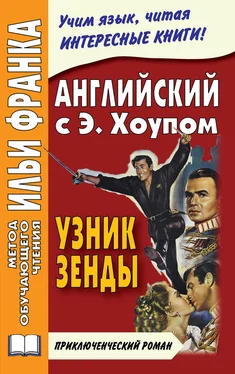


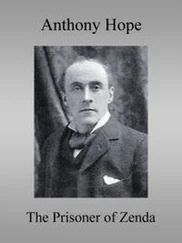

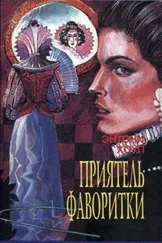


![Энтони Хоуп - Пленник Зенды. Месть Руперта [сборник]](/books/423551/entoni-houp-plennik-zendy-mest-ruperta-sbornik-thumb.webp)

